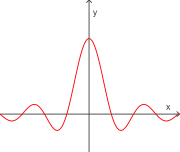Convert to interval notation[edit | edit source]
7.

8.

9.

10.

It helps to draw a picture to determine the set of numbers described:

A number in the set can be on either the red or blue line, so the entire number line is included.

It helps to draw a picture to determine the set of numbers described:

A number in the set can be on either the red or blue line, so the entire number line is included.

State the following intervals using set notation[edit | edit source]
Which one of the following is a true statement?[edit | edit source]
17.

Let

. Then
 , and
, and

Thus, 
falseLet

. Then
 , and
, and

Thus, 
false 18.

Using the same example as above, we have

.
falseUsing the same example as above, we have

.
false 19.

Evaluate the following expressions[edit | edit source]
Find the roots of the following polynomials[edit | edit source]
Factor the following expressions[edit | edit source]
52. Let  .
.
a. Compute

and

.
b. What are the domain and range of

?
The domain is

; the range is

,
The domain is

; the range is

,
c. Does

have an inverse? If so, find a formula for it.
No, since

isn't one-to-one; for example,

.
No, since

isn't one-to-one; for example,

.
53. Let  ,
,  .
.
- a. Give formulae for
i.


.

.
ii.


.

.
iii.


.

.
iv.


.

.
v.


provided

. Note that 0 is not in the domain of

, since it's not in the domain of

, and you can't divide by something that doesn't exist!

provided

. Note that 0 is not in the domain of

, since it's not in the domain of

, and you can't divide by something that doesn't exist!
vi.

![{\displaystyle (g/f)(x)=1/[x(x+2)]}](https://wikimedia.org/api/rest_v1/media/math/render/svg/9420d62f75928eb145c0933455cda94fe9b406be)
. Although 0 is still not in the domain, we don't need to state it now, since 0 isn't in the domain of the expression
![{\displaystyle 1/[x(x+2)]}](https://wikimedia.org/api/rest_v1/media/math/render/svg/c88b915e8cb5ba979495a707385342f8f93b6274)
either.
![{\displaystyle (g/f)(x)=1/[x(x+2)]}](https://wikimedia.org/api/rest_v1/media/math/render/svg/9420d62f75928eb145c0933455cda94fe9b406be)
. Although 0 is still not in the domain, we don't need to state it now, since 0 isn't in the domain of the expression
![{\displaystyle 1/[x(x+2)]}](https://wikimedia.org/api/rest_v1/media/math/render/svg/c88b915e8cb5ba979495a707385342f8f93b6274)
either.
vii.


.

.
viii.


.

.
b. Compute

and

.

;

.

;

.
c. Do

and

have inverses? If so, find formulae for them.
Yes;

and

. Note that

and its inverse are the same.
Yes;

and

. Note that

and its inverse are the same.
54. Does this graph represent a function?

As pictured, by the Vertical Line test, this graph represents a function.
As pictured, by the Vertical Line test, this graph represents a function.
55. Consider the following function

a. What is the domain?


b. What is the range?


c. Where is

continuous?


56. Consider the following function

a. What is the domain?


b. What is the range?


c. Where is

continuous?


57. Consider the following function

a. What is the domain?


b. What is the range?


c. Where is

continuous?


58. Consider the following function

a. What is the domain?


b. What is the range?


c. Where is

continuous?


59. Find the equation of the line that passes through the point (1,-1) and has slope 3.


60. Find the equation of the line that passes through the origin and the point (2,3).





![{\displaystyle \mathbf {[-{\frac {7}{3}},-{\frac {1}{3}}]} }](https://wikimedia.org/api/rest_v1/media/math/render/svg/b104122048fc9e635f5545b75af6c00aaa4ea1a0)



![{\displaystyle \mathbf {(-\infty ,{\frac {17}{9}}]} }](https://wikimedia.org/api/rest_v1/media/math/render/svg/9fd3ae67b4ccc96a3eed21c083909143ebe903f7)


![{\displaystyle \mathbf {[4,5]} }](https://wikimedia.org/api/rest_v1/media/math/render/svg/0b442569fbd0f32e69e66da80ad816bb9fb9005c)
















![{\displaystyle [3,4]\,}](https://wikimedia.org/api/rest_v1/media/math/render/svg/63aa416567092878c39b1a4fe774147243396e87)





























![{\displaystyle {\sqrt[{3}]{\frac {27}{8}}}}](https://wikimedia.org/api/rest_v1/media/math/render/svg/c81839c276466ff1ed552c297e24958adeda30c7)





![{\displaystyle {\frac {\sqrt {27}}{\sqrt[{3}]{9}}}}](https://wikimedia.org/api/rest_v1/media/math/render/svg/b940bef569d6d574c586d438a4cc7e69237a9024)






































































![{\displaystyle (g/f)(x)=1/[x(x+2)]}](https://wikimedia.org/api/rest_v1/media/math/render/svg/9420d62f75928eb145c0933455cda94fe9b406be)
![{\displaystyle 1/[x(x+2)]}](https://wikimedia.org/api/rest_v1/media/math/render/svg/c88b915e8cb5ba979495a707385342f8f93b6274)
























